By Ana Rodriguez Soto - The Archdiocese of Miami
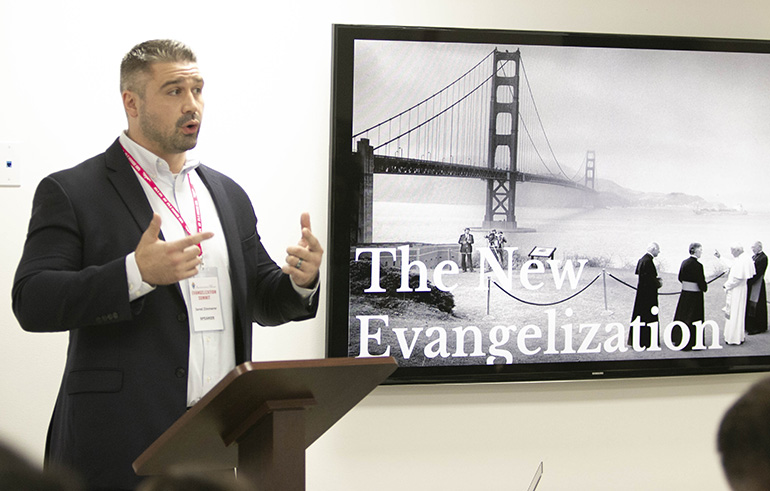
Photographer: ANA RODRIGUEZ-SOTO | FC
Jared Zimmerer, director of the Word on Fire Institute, was one of two keynote speakers at the archdiocesan Evangelization Summit, March 16, 2019, at Msgr. Edward Pace High School in Miami Gardens.
MIAMI GARDENS | Today’s statistics do not augur well for the future of the Catholic Church in the U.S.
Forty percent of people under 30 identify as “nones” — unaffiliated with any religion. That number stands at 50 percent for young people who were raised Catholic. Only 6 percent of Catholics — versus 75 percent of evangelical Protestants — consider it important to share their faith.
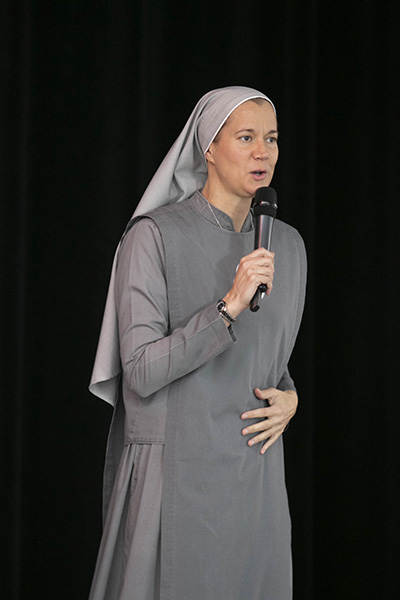
Photographer: ANA RODRIGUEZ-SOTO | FC
Sister Miriam James Heidland, of the Society of Our Lady of the Most Holy Trinity, was one of the keynote speakers at the archdiocesan Evangelization Summit, March 16, 2019, at Msgr. Edward Pace High School in Miami Gardens.
But after citing those and similar statistics, speakers at the archdiocesan Evangelization Summit, including Archbishop Thomas Wenski, said a return to the evangelizing ways of the apostles could change that trajectory. That means focusing less on doctrine and more on relationships.
“You got to love them,” the archbishop told more than 450 participants at the March 16 summit, who gathered in the chapel of Msgr. Edward Pace High School for the opening Mass. “You’re not going to evangelize anyone you don’t love. And we have to love them warts and all.”
He said that’s how the early Christians made the faith attractive to the pagans that surrounded them. “Our faith needs to be attractive. In fact, that’s how the Gospel won over the ancient world. ‘See how they love one another.’ The love of the first Christians – even towards their enemies – was attractive.”
He also noted that the most miraculous aspect of the apparition of Our Lady of Guadalupe is not the “tilma” where her image is imprinted, but the fact that within 10 years, three million of Mexico’s indigenous people had converted to Christianity.
NOT DEFEATED BUT BELOVED
Our Lady of Guadalupe looked like them and spoke their language, Archbishop Wenski said. Unlike the Spanish conquistadors who tried to convert them at sword point, her apparition revealed that “they were not a defeated people but a people beloved of God.”
“The speed and the success of the evangelization of Mexico is unparalleled in the history of Christianity. The Mexicans embraced the faith because they felt embraced by Mary,” the archbishop said.
The faith she showed them also was diametrically opposed to the one they practiced. While their faith called for them to sacrifice their children to the gods, in the Christian faith they found a God who sacrificed his son for them.
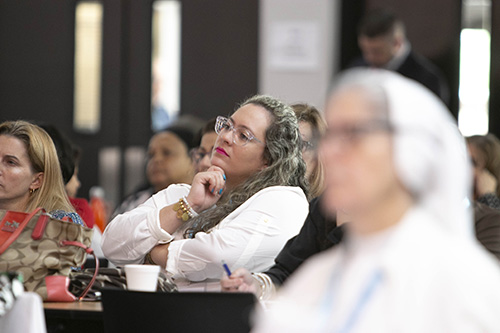
Photographer: ANA RODRIGUEZ-SOTO | FC
Participants listen to the keynote talk by Sister Miriam James Heidland of the Sisters of Our Lady of the Most Holy Trinity, during the archdiocesan Evangelization Summit, March 16, 2019, at Msgr. Edward Pace High School in Miami Gardens.
“People today are being sacrificed on altars erected to the false gods of our age. These are the same ancient gods of power, pleasure and plunder dressed up in new disguises,” Archbishop Wenski said. “We must make to the world an attractive proposal about a God that does not want death for us but life.”
Both keynote speakers at the summit stressed the importance of personal relationships as well. One of them was Jared Zimmerer, director of the Word on Fire Institute. The other was Sister Miriam James Heidland of the Society of Our Lady of the Most Holy Trinity.
DOING IT BACKWARDS
“It starts with belonging to a community, then believing what the Church teaches, then behaving” accordingly, said Zimmerer during a workshop that preceded his afternoon keynote. He noted that “we usually do it backwards,” expecting the behavior to precede belief and belonging to a community.
Zimmerer explained that the “new evangelization” refers to people who have “heard the Gospel but turned away.” They were baptized but left. And worse, he said, “they left and nobody cared.”
He called on Catholics to, in the words of Pope Francis, “make a mess” of the cliquishness that happens in churches and connect with those who don’t go to church.
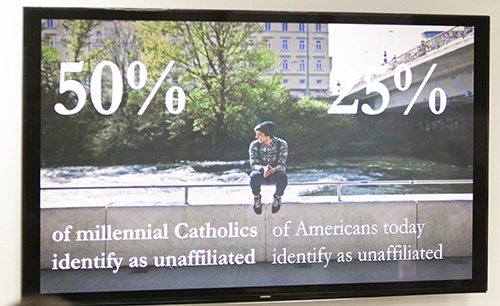
Photographer: ANA RODRIGUEZ-SOTO | FC
Jared Zimmerer, director of the Word on Fire Institute, cited this statistic as proof that the Church needs to engage in a "new evangelization," with new methods and new tools. He was one of two keynote speakers at the archdiocesan Evangelization Summit, March 16, 2019, at Msgr. Edward Pace High School in Miami Gardens.
“Each and every person has their own experience of faith, of Jesus, of truth, of life. And we’ve just got to dive into those experiences with them,” Zimmerer said. “Know those stories. Share your own brokenness.”
Sister Miriam made a similar point in her morning keynote. “Love is always an invitation and never a compulsion,” she said. The key to evangelization is living in a way that moves others to say, “I don’t know what you have but I want it.”
She shared her own story: an alcoholic at 21, sexually abused as a child, raped, clinically depressed. “How could God love someone like me?” she wondered. Then she met a priest “who changed my destiny.” She also had a mother who fasted and prayed for her, surrendering her to the Blessed Mother even to the point of praying that she would “become a nun.”
“All our secrets have to come out,” Sister Miriam said. “In the divine economy of salvation, nothing is wasted.”
THIRD SUMMIT
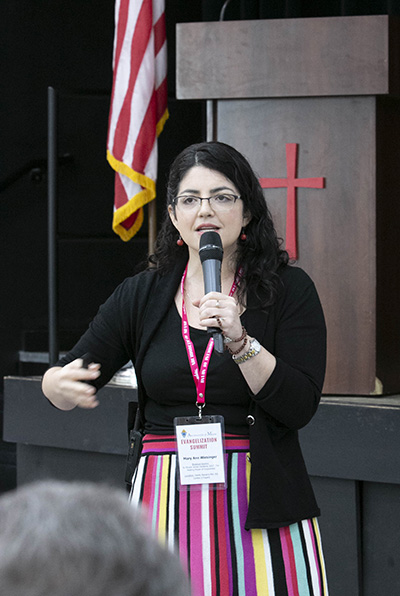
Photographer: ANA RODRIGUEZ-SOTO | FC
Mary Ann Wiesinger, archdiocesan director of Evangelization and Parish Life, speaks to participants at the archdiocesan Evangelization Summit, March 16, 2019, at Msgr. Edward Pace High School in Miami Gardens.
This was the third summit to be organized by the archdiocese in response to the recommendations made by the most recent synod, which ended in 2013. The other two summits focused on marriage and youth.
In addition to the keynotes, the summit featured eight workshops presented by representatives of local and national organizations, from Alpha for Catholics to St. Paul Street Evangelization. Those in attendance included archdiocesan catechists and school teachers, parish representatives, and young adults engaged in a two-year program of Missionary Discipleship.
Katherine Lantigua is one of 30 young adults, ages 22 to 35, who make up the archdiocese’s second Missionary Discipleship class. She said the program focuses on interior formation as well as preparing participants to share their faith and become “witnesses of Christ’s joy and love.”
Participants are required to attend a retreat every month and eventually make a five-hour a week commitment to a parish ministry. In most cases, they minister to other young adults.
“It’s super beautiful. It’s been absolutely amazing,” said Lantigua, a member of St. Mark Parish in Southwest Ranches.
Marta Acosta-Rico, a teacher at St. Hugh School in Coconut Grove, also said she was impressed by the array of learning opportunities at the summit. “It’s actually better than I thought it would be. Very good speakers.”
More words of advice came from Mary Ann Wiesinger, director of the archdiocesan Office of Evangelization and Parish Life. “Take notes,” she told participants, “and take them back to your parishes. They need to hear your testimony. They need to hear what [God] has done for you.”
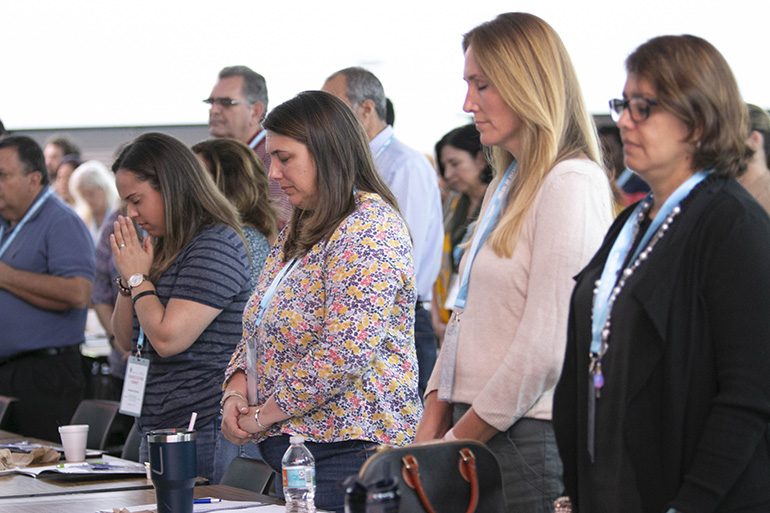
Photographer: ANA RODRIGUEZ-SOTO | FC
Participants pray at the start of the keynote talk by Sister Miriam James Heidland of the Sisters of Our Lady of the Most Holy Trinity, during the archdiocesan Evangelization Summit, March 16, 2019, at Msgr. Edward Pace High School in Miami Gardens.

